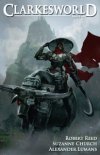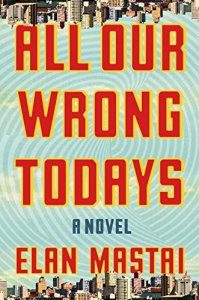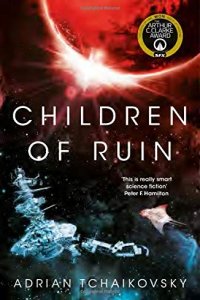Lois Tilton reviews Short Fiction, early May
The usual monthly ezines, plus a couple of less usual ones. The web is making it possible for individuals to create and publish their own personal visions for a magazine, and the quality is often as high as readers can find in more traditionally professional zines.
Publications Reviewed
- Clarkesworld, ay 2012
- Apex Magazine, May 2012
- GigaNotoSaurus, May 2012
- Redstone SF, May 2012
- Mirror Dance, Spring 2012
- Bourbon Penn #4, April 2012
Clarkesworld, May 2012
A dystopian issue.
“Prayer” by Robert Reed
Climate change has produced global crises, and the US now occupies Canada in the name of its AI Almighty.
I would even go so far as to propose that the distant generals were aware of their limitations yet sent the troops across the lake regardless, full of religion and love for each other and the fervent conviction that the United States was the empire that the world had always deserved.
Of course there is an insurgency, and Ophelia is part of it. Her nom de guerre is Ridiculous; her sentient second-hand railgun is Prophet. But who is on what side, and who is using whom?
A cynical and scary story, primarily because we can see it all coming into being now as powerful interests pursue their own ends while the cries of the masses go unheeded. The narrative alternates among points of view, suggesting an answer to the question: how many sides are there?
–RECOMMENDED
“Synch Me, Kiss Me, Drop” by Suzanne Church
It’s obvious that Alex is a loser, but a question whether this is owing more to his own character or the milieu in which he lives, with much of the population hooked on nanites that deliver a powerful group high based on synchronized music.
The beats were building again. This time, with a third-beat thump, like reggae on heroin. I could feel the intensity from my fingertips to my teeth to my dick. Even if I couldn’t hear more than the background beats, I anticipated the drop. Rain opened her mouth again, raised both her hands in the air with everyone else, like a crowd of locusts all swarming together.
Clubbing the night away, Alex pursues the ultimate high while careful not to violate the terms of his probation for the accidental death of a girlfriend while under the influence.
This is Cautionary Tale that reminds me of the experiments in which rats self-stim their pleasure centers to the point of starvation. It’s clear that Alex hasn’t learned his lesson, but the author’s graft of the Jessica story onto Alex’s club night seems forced.
“All the Things the Moon Is Not” by Alexander Lumans
It seems that the moon is covered with a hallucinogenic yellow mold, and the US has sent up a crew of four astronauts to harvest it. There is also a Russian mold bootlegger up there, and Murphy is obsessed with the chess games they play together – Tchaikovsky always wins. Everyone is crazy with the mold. Weird things happen, which may or may not have actually happened.
An absurdist piece, which seems to have as its point that a small isolated group of people on hallucinogenic substances will do crazy things. But the overall scenario is absurd – megafauna suddenly appear and rampage on Earth – with no point that I can discern.
Apex Magazine, May 2012
The editorial suggests that the issue’s theme is things falling apart, which is certainly true of the Swirsky story.
“Decomposition” by Rachel Swirsky
Revenge falls apart. Vare strikes back at his enemy by killing his two young daughters, but the corpses intrigue him and he takes them home to play with.
Ayl went onto a threadbare daybed. Delira lay across the thinning velvet of a loveseat, still-growing mahogany curls draping over the arm.
The housekeeper spoke hesitantly. “Should I fix them a room…?”
Macabre fantasy, in which Vare is seen to be as much under his own spell as his victims. The narrative voice, tinted with dark humor, makes it a treat for readers.
“Tomorrow’s Dictator” by Rahul Kanakia
Sasha is the dictator of Walden Three, an adjustment cult where she brainwashes the residents – including her husband – into giving over their will to her. But the job is stressful and she needs to find a successor.
Sasha needed this to work. She couldn’t bear to ride home with George babbling away. She couldn’t bear another year of staring down the sheep at the general assembly. She needed someone else. She needed a partner.
A story about control, and getting what you wish for. If the characters had any depth, it would be a tragedy.
GigaNotoSaurus, May 2012
“Tilia Songbird” by Francesca Forrest
Anj is the Cinnabar Empire’s governor of the Cloud Mountains, a backwater where careers go to die. One day a strange girl enters her office, sings a song, then leaves with a feather from one of her bluetails.
“I wanted you to know me,” the girl said, tracing the door jamb with the feather. “Now you know who I am.” Then she was gone.
The locals revere Tilia and her songs and her chaste kisses, believing that she confers blessings from the spirits. But among Tilia’s home tribe, rumors of her kisses have given rise to a different interpretation, and now they have sent an envoy to demand her return. More, they offer in exchange an alliance that could be to the great advantage to the Empire – and thus to Anj. Anj doesn’t believe in spirits, but she senses that Tilia indeed has the power to confer blessings.
The story belongs to Anj, both a capable imperial governor and a virtuous individual – not always an easy combination to carry off. But the scenario makes it pretty easy for her – a bit too easy; things work out very conveniently well. Quibble: Kehan is portrayed as a prosperous landowner, with others working for him. Why, then, is he fixing Anj’s leaky roof?
Redstone SF, May 2012
I take issue with the romance of space colonization.
“Imagine Cows on Mars” by M Bennardo
Well, at the moment, it’s yaks. Terraformers are working on Mars, but settlers aren’t supposed to be there yet. They come anyway, sooners, though most die in the attempt. Earth, we gather, is the greater evil, even with the fungal disease that afflicts the settlers.
I suppose it’s theoretically possible, with an effort, to read something like this without a moral dimension, an account of pioneers in an alien landscape. But that would be perverse, particularly in this publication. It seems pretty clear that we’re supposed to admire these intrepid pioneers, but I don’t find their enterprise admirable at all. The sooners are not only free riders, they’re thieves; they appropriate for their own use goods, such as the yaks, that they don’t own. The terraformers have to divert resources to ensure their safety. I find it particularly offensive when the narrator tries to guilt-blackmail a terraformer into bringing scarce drugs for a sick child, taking a position of moral superiority that he’s not entitled to.
“I want you to owe me,” I said. “If you don’t bring back the rings or the medicine, you’ll be stealing from me. One way or the other, you’ll at least have to come back and face me again.”
But because it’s the golden calf of space colonization, we’re supposed to applaud, even when one of the settlers says, “But when we’re finished with Mars, it’ll be another Earth.” Poor Mars. Imagine diary factories and shit lagoons.
“Into Place” by Alter S Reiss
LaMarr constructs mind traps, and he’s probably the best there is. The trap attracts the target mind and holds it in a catatonic state – the better the trap, the longer it works. He used to work for the government, now he works for a company of dubious ethics. His current job is a wife involved in a custody dispute; the client is her husband. But LaMarr doesn’t have any misgivings about his work.
“When you’re in a trap, there’s no pain, there’s no worry beyond the context of the trap. Everything is solvable, everything is manageable. You can leave whenever you want, Dan. If Anne Marion wanted to leave the trap that I’ve built for her, she could do it now, this very instant. She’s won’t. She’s in the trap because it’s better than being outside the trap.”
LaMarr may not have misgivings, but LaMarr isn’t exactly normal. He doesn’t seem to consider that life is bypassing the lives in his traps, or that others may be suffering her loss even if the target is not. The mind trap seems to be a lot like an addictive euphoric drug, and I think LaMarr, absolving himself from responsibility, gravely overstates the degree of the target’s free will. It’s an interesting moral situation.
Mirror Dance, Spring 2012
An online fantasy quarterly that seems to be a personal project of the editor, Megan Arkenberg. She expresses a preference for “beautiful but readable prose” and “LGBTQA characters”, which is reflected in the contents. There are four original prose short stories as well as some poetry. The Pre-Raphaelite art is striking, but that’s not my department.
“The Love Mod” by Anna Sykora
Mod is for model, a synthetic [organic] human designed for a specific purpose. André was designed for love by Simone de la Tour, who was so pleased with her creation that she intended to marry him until André jumped out of the carriage and fled.
He imagined serving the aging Simone’s sexual pleasures till she died. He imagined getting decommissioned then–his memories pillaged, his life force drained, his perfect body stuffed down a recycling unit…
Now on his own in Paris, he is penniless and helpless, so naturally falls into the hands of the unscrupulous.
Another variation on the love-robot meme, but this one turns out to be lightly cynical humor. More interesting, though, is the setting, a Parisian cross between the fin de siècle and a fantasy future, where carriages are pulled by designer-color horses and whores are paid in Euros. There are several sly references that add interest, such as André’s rescuer Klaus Klinski. Altogether a nice mannered entertainment that doesn’t take itself too seriously.
“Fog” by Carol H March
The fog is emotional, not meteorological. A couple’s relationship begins to fail.
One day everything was fine; the next a logjam of words smothered in the interest of peace had formed an impenetrable dam in my throat. When I tried to clear it, I saw the cloudiness in the space between us. Clear edges had blurred.
While the 2nd-person narrative is nominally addressed to the lover, it is in essence just the narrator’s own voice. The metaphor is effective, but there is no actual fantastic content.
“The Players” by Caroline Spencer
John finds himself awake in an attic room full of sleepers, and he leaves to explore the house where, he believes, he is held captive. Corridors and doors lead on to others, including a hallway full of portraits.
The rectangular canvasses were mounted in a variety of elaborate frames and had been arranged to cover the walls with only the smallest gap between each one. John noticed with a strange chill that every single portrait showed a person sleeping.
Finally he meets a man who tells him that the house is the setting of a game, and none of the players can see each other – except that John can see the other man.
The author mentions that many of her stories have their origin in dreams, and this one definitely has that quality. Dreamlike, it makes no literal sense, although the reader has the feeling there is sense to be made of it, if only it would be revealed. Mysteriously intriguing.
–RECOMMENDED
“The Ale Wife” by Christopher Owen
Soldier Tom Bobbin visits a tavern and falls in love with the ale wife. His feelings are not reciprocated. He persists.
“Lorena my sweet. Perhaps we are going about this all wrong. I must prove my worthiness to you. Offer me a challenge. I will do anything for you, anything. I can climb high mountains and swim broad lakes and rivers. I’ll fight any man. I’ll fight a bear. A brace of bears!”
A foolish protagonist makes for a less interesting story. The narrative is flawed with anachronisms. We appear to be in the “old days”, so Tom ought to know that “wife” means simply “woman.”
Bourbon Penn #4, April 2012
Another e-quarterly, this one quite different from the above, as the illustrations illustrate. The defining term is “odd”. This issue seems to be subtitled: Nervous Breakdown [Don’t Apologize for Acting Out of Line]. As usual with these ezines, the stories tend to be short. There are six of them, some nice little bits of absurdity.
“Pearls” by Priya Sharma
The narrator is a painter with slithery hair, whereby we know her identity. It’s not easy being a gorgon. Stalkers tend to seek her out. It was better before, in the world she was born to.
A twist turns this one into a love story. The author takes liberties with the myths, but what else are myths for?
“The Mall” by Hannah Lackoff
A plastic setting where an older form of existence sometimes unwelcomely intrudes, like the fairy-things who steal babies out of their strollers. The center of the mall and the story is the fountain where a plastic boy holds a plastic fish that spurts water.
The boys’ hands are green, but it’s not the green of pleasant mosses and coppery rust; it’s the green of Hot Topic nail polish and wayward highlighters, of sale stickers and plastic house plants. He is fake, and he can’t help it. He doesn’t know any better.
A series of vignettes from the points of view of various mall visitors. Oddly, the story celebrates the plastickness of the mall, appreciated by its denizens who find refuge and satisfaction there.
“A Blade of Love” by Nathaniel Tower
Allan Thermoose’s wife is in love with a blade of grass. It’s the 375th blade, directly even with the crack in the third slab of sidewalk east of the mailbox.
We note from the first sentence that we’re in absurdityland. This is a nice example of the species. Another husband would probably pour Round-Up over his gramineous rival, but the real oddness is Allan’s complaisance.
“The Langsammachen Pitch” by Martin Zeigler
Baseball. The Gazelles are in a slump, so the owner brings in a special attraction, Professor of Physics Horst Langsammachen.
The sports lead in last week’s Sentinel certainly helped. “If you must witness one miracle this year,” it proclaimed, “then see the unbeatable, unbattable, unbelievable pitch of this Einstein of the Diamond, this Newton of the Hill, this Euclid of the shortest distance between the mound and home plate.”
A nice Tall Tale in the baseball subgenre. Readers familiar with German will guess the nature of the Professor’s special pitch.
“After the Bees” by Carson Becker
When Sara took up with Heidi as her lover, she didn’t know that Heidi had bees living in her hair. Sara assumes she is allergic. But the bees aren’t the real problem in their relationship.
Sara wanted to know when she would see Heidi again. Heidi wanted Sara to stop asking and enjoy the fucking moment. Sara should learn to relax. Heidi obviously thought fairies came at night to carry used teabags from sink to trash.
The liberation of Sara is delightfully odd.
“Mereá” by Nancy Hightower
Gil’s wife walked off and disappeared one night when they were camping in the desert. The guides tell him he must go to the underground city Mereá, who might let him find her again. Mereá is a place of remembering and forgetting.
Legend has it that some nights there are twenty steps leading down into the heart of Mereá; other nights there are thirty. Or one hundred. There are some who descend forever, another warned him.
A surreal journey into the dark heart of memory and self-awareness.
–RECOMMENDED






Pingback:The Play’s the Thing « Nancy Hightower